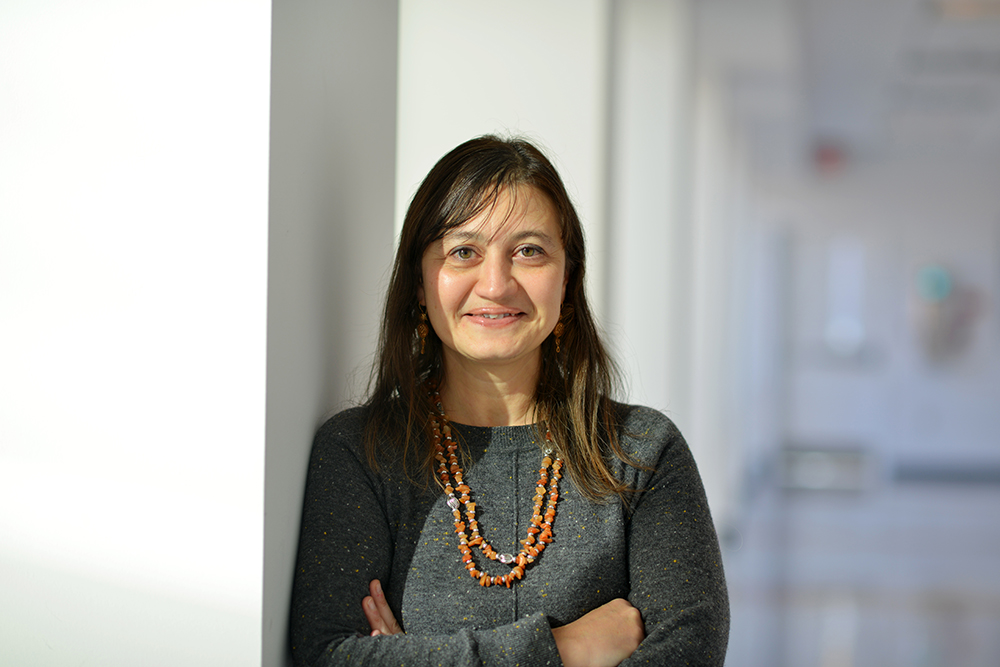 |

|
 |
Cinzia Cirillo, professor, UMD civil and environmental engineering department and interim director, Marylamd Transportation Institute. |
|
The University of Maryland will lead a multi-institutional center aimed at improving the mobility of people and goods across the country and will participate in two others focused on transportation safety and equity.
UMD and partner institutions—Morgan State University, North Dakota State University, San José State University, and White Earth Tribal and Community College in Minnesota—will receive $10 million over five years for the Center for Multi-Modal Mobility in Urban, Rural, and Tribal Areas through the U.S. Department of Transportation’s University Transportation Centers (UTCs) Program. The center is among 34 new UTCs funded by the federal agency.
“Together with our partners, we’ll be working to expand the transportation options for communities across the United States that have had only limited choices in the past,” said UMD civil and environmental engineering Professor Cinzia Cirillo, who is serving as interim director of the university’s Maryland Transportation Institute (MTI). “We’re excited about this opportunity to make a tangible difference.”
The new Tier 1 center will be housed at MTI, a research hub that brings together interdisciplinary expertise from across the University System of Maryland.
The center will focus on three strategic goals identified by USDOT: economic strength and global competitiveness, equity, and climate and sustainability. Among other topics, researchers will study the potential of unmanned and autonomous vehicles—both ground and air—to streamline the movement of people and goods, investigate ways to incentivize greater use of public transit, identify the key contributing factors to transportation-related inequity, and explore the potential of modalities such as rideshares, vanpools and microtransit.
While vital both to the economy and quality of life, transportation in the U.S. poses equity and environmental issues. A significant minority (8.5%) of American households do not own a car, according to census data, while a report from the National Equity Atlas indicates that as many as 18% of Black households lack access to a vehicle. In rural areas, public transit is often limited or nonexistent due to low population and a limited tax base. In part because of a heavy reliance on gas-powered vehicles, transportation is the single largest contributor to U.S. greenhouse gas emissions.
Addressing these and other challenges has been an ongoing concern for UMD researchers. Cirillo, for instance, has studied “complete streets”—that is, streets that are optimized for multimodal travel—as a way of lowering emissions and increasing equity, while UMD civil and environmental engineering Assistant Professor Xianfeng “Terry” Yang is investigating the potential of automated and smart vehicles as transit options to lower-income and disabled Americans.
“It’s important that we take steps as a nation to ensure the long-term sustainability of our transportation system, and to solve lingering problems of equity,” said UMD Vice President for Research Gregory F. Ball. “UMD is uniquely well-positioned to contribute to these efforts, given our national reputation in engineering and in the use of data science to understand transportation-related issues.”
UMD is also a partner institution in a regional UTC, the Sustainable Mobility and Accessibility Regional Transportation Equity Center, which is being led by Morgan State University (MSU). “This will continue to strengthen our long-standing relationship with MSU,” Cirillo said.
In addition, UMD is a partner in another Tier 1 University Transportation Center announced this month, the Research and Education in Promoting Safety Center, which is being led by Howard University. Nii Attoh-Okine, chair of the UMD civil and environmental engineering department, is part of the consortium in that grant.
“We’re thrilled to be involved in three new UTCs that are dedicated to ensuring America has a transportation system that provides secure and safe operations, and supports our economic needs while addressing long-standing problems of access and equity, as well as climate impacts,” Attoh-Okine said. “These new centers will further cement our strong reputation as a top-line transportation program, one that is not simply resting on past achievements but moving forward.”
Related Articles:
Study Finds Race-based Disparities in Railroad Safety
Legacy of Racism Linked to Higher COVID-19 Death Rates
Cirillo Named MTI Interim Director
UMD Research Sheds Light on Holiday Travel and COVID
FAA Extends Funding for NEXTOR III Aviation Operations Research Consortium
MTI Announces Seed Grant Awardees
New Funding Opportunity for MTI Faculty Affiliates
Better, More Reliable Transportation Statistics
Smart signals, safer intersections
Minha Lee Awarded Transportation Association Doctoral Scholarship
March 30, 2023
|

